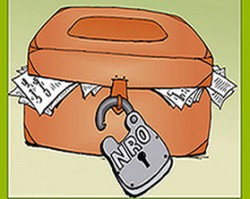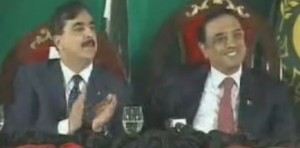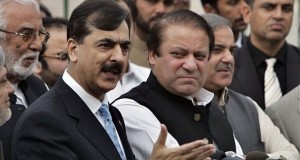Afghanistan’s election crisis has temporarily abated, but Pakistan could soon face a volatile political transition of its own. President Asif Ali Zardari is under ever-increasing pressure to resign. His influence and power is dwindling and will likely continue to diminish in the coming months. By this spring, the Zardari presidency could meet its end.
There have been several waves of pressure on Zardari this year, coming primarily from the Army and segments of the private media — both see Zardari as inept, corrupt, and unpatriotic. And it appears that the Army is entering into a decisive final stage in its power struggle with Zardari, which began with the latter’s attempt last year to put the Directorate for Inter-Services Intelligence, the military’s chief spy service, under civilian control. Until now, Zardari has called his opponents’ bluff, and they, lacking the constitutional means to remove him, have faltered in their attempts to oust him. But cracks in Zardari’s political coalition are emerging and he is more vulnerable now than ever.
Pakistani politics has historically been marked by extreme bandwagoning around an ascending power broker. Smaller parties ride it to the top, but once the political peak has been reached, they vacate their defensive positions and join the attacking side.
Zardari is fast falling prey to this dynamic. In a recent television interview, for instance, Altaf Hussain, head of the Muttahida Qaumi Movement (MQM) — a second-tier political party and member of Zardari’s coalition government — asked the president to resign. Hussain has since backtracked after MQM parlays with Zardari’s Pakistan Peoples Party (PPP). But the MQM and other parties successfully prevented the PPP from renewing the 2007 National Reconciliation Ordinance (NRO), an amnesty bill that benefitted Zardari and other members of the coalition government.
Without this parliamentary protection, Zardari and his allies are now exposed, wounded, and the sharks smell blood in the water. Some would like to leave him limbless — without meaningful constitutional powers to impact the political process — but alive enough to make key concessions and serve as a figurehead. Others are aiming for the jugular.
The Pakistani Army, by all indications, would like to see Zardari go, having tried to push him closer to the exit door in March and August of this year. Zardari’s accidental presidency, which was produced by his wife’s assassination and political deal making to secure an indirect election, was never quite accepted by the Army, which sees him as overly dovish, if not “traitorous,” on security issues, like India, and is on edge about the president’s attempts to impose civilian oversight over the military.
The scheduled retirement of Chief of Army Staff Gen. Ashfaq Kayani in November 2010 is likely to add further strain to this relationship. Zardari, as president, has the power to appoint the head of the Army and other military services. His dysfunctional relationship with the Army could create a sense of uncertainty within the institution and fear that its corporate autonomy and monopoly over shaping national security policy are under threat. As Pakistan battles a hydra-headed insurgency in its Pashtun belt and the United States seeks an endgame in Afghanistan, healthy civil-military relations in Pakistan are critical.
Most political elements — including Zardari’s own prime minister and his party’s vice chairman, Yousuf Raza Gilani — would settle for him to be constitutionally neutered, ending the president’s ability to dissolve parliament and appoint military service chiefs. Gilani seeks an empowered premiership. And toward this end (some Pakistani commentators speculate, with good reason), he has been colluding with the Army and elements of the opposition to weaken Zardari’s position.
However Gilani is playing his cards, he has a difficult balancing act to maintain, for he could be discarded if and when Zardari is ousted by the Machiavellian maneuvering of opposition leader Nawaz Sharif, who covets a third shot at the premiership. Gilani could, at least for the next year, be an asset for Sharif — serving to neutralize Zardari and constitutionally empower the presently weakened office of prime minister. It would make political sense for Sharif to then push for midterm elections just after the economic and security climate bottoms out and once the prime minister’s office is fully empowered. (One can almost hear Sharif’s advisors saying, “Let Gilani, Zardari, and the PPP do the dirty work.”) To serve as prime minister for the third time, Sharif would need a constitutional amendment passed by a two-thirds majority in parliament to lift a two-term limit on the premiership. Sharif can only get this passed via deal making with other political parties, but the Army can also get in the mix, make some deals of its own, and shut out Sharif.
But when it comes to Zardari’s fight for political survival, it’s the second-tier political parties, such as the MQM, that are the true wildcards. Since no party in Pakistan currently holds a parliamentary majority, the smaller parties have a veto power on parliamentary votes (such as for impeachment). Not surprisingly, these parties are using their wild-card status — coupled with Zardari’s vulnerability — as a bargaining chip in order to influence his actions to their benefit. The MQM, for example, would like governorship of Sindh and to retain administrative control over urban areas of the province. But it and other small parties generally side with the dominant or rising power broker. The recent MQM push against Zardari signals, at least, a political consensus in favor of a weakened Zardari.
If these parties continue to successfully manipulate Zardari he will become a ceremonial president, which would result in nothing short of a political prison. It would deny him tangible power and delay his eligibility for a run for the National Assembly, and thus for the premiership, until two years after his presidential term ends. What’s more, internal divisions within the PPP are sure to increase as Zardari’s capacity to influence events declines and alternative power centers grow in his place.
Zardari’s decline has serious implications for U.S. policy toward Pakistan. His political neutralization would deny the United States a local civilian lever against the Pakistan Army. Restraining the Army’s praetorianism, some in Washington argue, will markedly reduce its support for militants in Afghanistan and India, as Pakistan’s major political parties (particularly the PPP) are far more inclined toward normalizing ties with neighboring states.
As the challenges in Afghanistan grow and Zardari weakens, Washington becomes increasingly dependent on the Pakistani Army. In fact, U.S. success or failure in Afghanistan will, in part, be decided by the Pakistani Army, which can influence the tempo and trajectory of the war with its control of supply routes from the Arabian Sea into Afghanistan and unparalleled access to Afghan insurgent groups.
Although the United States could try to use Sharif — a vocal advocate of civilian control over the military — he has a long history of leveraging anti-American sentiment and has been unwilling to adopt a firm position against the Taliban. Furthermore, if Washington indelicately shifts its patronage from Zardari to Sharif, the Army could intercept the telegraphed pass.
Within the next few years, Zardari’s political demise could also impact Pakistan’s ideological balance of power. Without meaningful internal reform, the future of the PPP — Pakistan’s largest center-left party — is at stake. Zardari’s unpopularity and inability to legitimately lay claim to the Bhutto name has weakened the PPP in Punjab, Pakistan’s most populous province. But he, at least, provides some nominal continuity from the Bhutto era as Benazir’s widower.
Internal elections and a reinvigorated push for social justice could bring the PPP back to relevancy. But without that change, the PPP could be reduced to a feudal strip in southern Punjab and rural Sindh, and of declining importance in an increasingly urbanized Pakistan. Indeed, for Zardari, the greatest challenge is not to save his presidency, but to save his party.
The PPP is both a family enterprise dominated by the Bhuttos and Zardaris and a national institution that anchors Pakistan’s secularists and leftists. If the PPP sank along with Zardari, Pakistan would be without a truly national party — the remaining major parties are ethnic or regional — and the odds of ethnic and political fragmentation would increase dramatically. A leaderless left would also embolden the nationalist and Islamic right as Pakistan confronts jihadis at home and debates whether to continue supporting them in the region. And so as Zardari ponders his political future, let us hope that he does not bring down his party, which is critical to his nation’s stability, in a bid to save his imperiled presidency.
 Much has been discussed about the in-famous National Reconciliatory Ordinance where 5,800 crooks were pardoned by the then President Pervaiz Mushrraf as an attempt to broker a deal for his own extended stay as the President of Pakistan. This NRO in effect opened the flood gates to allow thousands of white collar criminals and murderers to return back to Pakistan and reestablish themselves to (re)loot Pakistan yet again, and by golly in the short spam of three years they have done a brilliant job, heck third time around they went straight into business, since now these were all hardened criminals now given an executive golden key to make millions courtesy of a selfish dictator who thought his own stay in Islamabad was more precious then the country itself
Much has been discussed about the in-famous National Reconciliatory Ordinance where 5,800 crooks were pardoned by the then President Pervaiz Mushrraf as an attempt to broker a deal for his own extended stay as the President of Pakistan. This NRO in effect opened the flood gates to allow thousands of white collar criminals and murderers to return back to Pakistan and reestablish themselves to (re)loot Pakistan yet again, and by golly in the short spam of three years they have done a brilliant job, heck third time around they went straight into business, since now these were all hardened criminals now given an executive golden key to make millions courtesy of a selfish dictator who thought his own stay in Islamabad was more precious then the country itself














